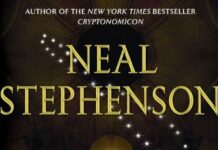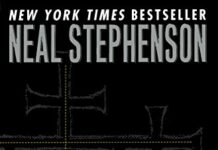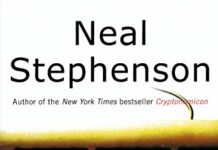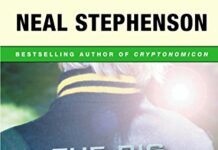
Ebook Info
- Published: 1998
- Number of pages: 514
- Format: Epub
- File Size: 0.56 MB
- Authors: Neal Stephenson
Description
And who could be smaller or more insignificant than poor Little Nell – an orphan girl alone and adrift in a world of Confucian Law, Neo-Victorian values and warring nanotechnology?
Well, not quite alone. Because Nell has a friend, of sorts. A guide, a teacher, an armed and unarmed combat instructor, a book and a computer: the Young Lady’s Illustrated Primer is all these and much much more. It is illicit, magical, dangerous.
And it isn’t Nell’s. It was stolen. And now some very powerful people want to get their hands on this highly desirable object. Nell is about to discover that the world can feel very small indeed . . .
‘6.0 stars. Among the best books I have ever read’ GoodReads Review
‘If Snow Crash was so good that cyberpunk went in to a coma, The Diamond Age effectively pulled the plug’ GoodReads Review
‘This is Great Expectations with nanotechnology’ GoodReads Review
User’s Reviews
Amazon.com Review John Percival Hackworth is a nanotech engineer on the rise when he steals a copy of “A Young Lady’s Illustrated Primer” for his daughter Fiona. The primer is actually a super computer built with nanotechnology that was designed to educate Lord Finkle-McGraw’s daughter and to teach her how to think for herself in the stifling neo-Victorian society. But Hackworth loses the primer before he can give it to Fiona, and now the “book” has fallen into the hands of young Nell, an underprivileged girl whose life is about to change. –This text refers to an alternate kindle_edition edition. From Library Journal Diamond Age, a Hugo Award-winning romp into a future nanotechnological revolution, doesn’t lend itself to concise description. For what it’s worth, it explores what happens when an incredibly powerful interactive device falls into the hands of a street urchin, who uses it to reprogram the future of humanity. Got that? Stephenson’s books rank among the most popular sf novels of recent years but require such close attention that they pose special challenges for audiobook fans. Jennifer Wiltsie’s narration here is uniformly strong and well fitted to the material, but this may not be the right kind of book for the average person. Recommended for libraries that count many young and hardcore sf readers among their audiobook patrons.Originally published in 1992, Snow Crash is a popular sf novel in a genre that some wags have dubbed “cyberpunk.” Listening to it is like taking an out-of-control roller coaster ride on a double helix, weaving in and out of Stephenson’s fully imagined computer-generated “Metaverse” and a near-future real world comprised of bizarre microstates and a vast Mafia-controlled pizza delivery system. The central character, aptly named Hiro Protagonist, is at once a computer hacker, pizza “deliverator,” and samurai swordsman. The story moves at such breakneck speed that many listeners may need to replay the first reel simply to figure out what is going on; however, the highly charged reading by actor Jonathan Davis another Frank Muller in the making helps hold everything together. Recommended for libraries catering to forward-looking sf readers. Kent Rasmussen, Thousand Oaks, CACopyright 2002 Cahners Business Information, Inc. –This text refers to an alternate kindle_edition edition.
Reviews from Amazon users, collected at the time the book is getting published on UniedVRG. It can be related to shiping or paper quality instead of the book content:
⭐ This started SO WELL!!! I loved the interesting new world and many of the characters….but HATED the ending- which was not an ending. The book builds this complex world filled with complex characters- then jettisons many of the characters abruptly for no reason. Miranda starts as an interesting person- then ends as a limp character in a stage with a chunk missing about why it had to be her. The sections with the drummers were AWFUL- back to using the bodies of women for the pleasure of men, except that they catch on fire- willingly or drugged? How banal. Overall, I was HUGELY disappointed- I kept reading, hoping it would get better- it didn’t and then it just ended as if the author was bored with the story. Was there even a plot line to follow? Was there an editor involved at all?
⭐ This is my favourite book, despite many many flaws.I’ve read it five times now, and Nell’s journey from abused child to [spoilers] is something that never ceases to enthrallThe characters that drive and interweave with her story are intricate, bizarre and original.The problem with the book (and the reason why it’s really not for everyone) is that some of the writing is close to impenetrable: Neal Stephenson has a habit of using the most arcane words to describe mundane items, and of going off on utterly bizarre tangents that generally distract from, rather than enhance the story.All that said, if I had a few spare million in the bank, I’d kick down every door I could to buy the TV rights to this. The book itself is in two parts, which would transition perfectly in to series 1 & 2 of a Netflix style production; with a series 3 begging to be extrapolated from “what happens next”.If you don’t mind a challenging read then this story is amazing.
⭐ This is not my first Neal Stephenson book. As a matter of fact, it’s my third. I wasn’t planning on reading another one, but a friend who is also an avid reader recommended it. I must say that I preferred the other two books (Snow Crash and Cryptonomicon). Since this isn’t a review of those books, I won’t delve into why I liked those better. Rather, I will try to define why I didn’t like this one as much.First, this is not a bad book by any stretch of the imagination. It starts with three separate plot lines that are not strong enough to stand alone, so you just know they are going to come together. To his credit, Stephenson maintains the suspense of how they will come together quite well. The character development is mixed. Some of the characters are well formed with flaws and all the aspects of a real human personality. Others tend to get more caricature treatment, even though they are not bit players in the plotline.Mostly, the characters and imagery is solid. This is what I like about Stephenson’s writing. He uses a broad pallet in his writing that shows deep skill as a writer along with artistic flourishes that send me regularly to the dictionary to learn about some arcane word that I’ve never seen before. Some would find this annoying. Why use an obscure word when an average, everyday one will do? Because, it adds color and flair and that’s what makes good writing.The Diamond Age feels at once historical and futuristic. That’s not an easy thing to do, but Stephenson does it beautifully. Maybe that’s why I keep coming back. If you’re reading this review, the plotline probably already got your attention. Go ahead, jump in, the water is fine!
⭐ Along with Pride and Prejudice, this is my favorite novel of all time. It is a vision of a near-future world in which conventional governments have been replaced by “phyles” that recruit members according to various criteria that correspond to the values they promote. If one does not belong to a phyle, one is in great jeopardy in this world. One of the most powerful sects (and central to the plot) is the Neo-Victorian Atlantis phyle, which believes in Victorian values, including the value of engineering. One Vicki engineer creates an interactive book, the young lady illustrative primer of the title, which falls into the hands of a very young girl who is a thete, a person not belonging to any phyle and thus the lowest class socially. The rest of the novel is a bildungsroman or novel of education, as Nell uses the primer to educate herself. The resulting journey is delightful as Nell becomes the most wonderful stoic hero one could ever hope to meet. If you decide to read this novel, and I hope you do, you will not regret accompanying her on her journey.
⭐ In light of the subsequent development of an “A.I.” Barbie doll that is purported to be about to hit the consumer market; this book is actuallyprophetic. Some reviews have said it was a difficult read but it is actually a highly nuanced read. Stephenson is writing on many levels about the complexity of global economics, technologies and cultures and the impact of the “haves” on the “have-nots”.The book is part steampunk, part Dickensian and part fairy tale but they are all interwoven very well. Since there is no glossary provided it would seem the writer did not want the reader to get bogged down wondering what certain things were but to infer what they might be via context. Important “unknowns” are eventually defined or described in detail although not always when first introduced into the storyline so a “leap of faith” is sometimes required.This is a book for readers who like subtlety and who appreciate an author who has an imagination to flex and ideas to explore and develop, it is not a point A to point B plot at all. Invest the time-it is definitely worth it.
⭐ Bronze Age, Iron Age, Diamond Age… Say what? Yes: the Diamond Age, the age of nanotechnology, where windows made from perfect, crystalline carbon are cheaper than those of glass. That’s what this book is about: the tech and the social implications thereof. As we’ve come to expect from Stephenson, the tech in this book, no matter how advanced and extravagant, is well thought out and coherent. The writing is crisp, lucid, and, at times, beautiful. Rarely, if ever, do we encounter an awkward choice of words or a badly turned phrase. I pretty much enjoyed the book from the first word to the last.I have two quibbles:1. The story arc, its length and complexity, led me to expect a bigger and more explosive climax. The end seemed slightly abrupt to me.2. Some character development seemed weakly linked to character importance in the story. Some characters, whose contribution to the story seemed secondary, got quite a bit of space. Other characters, who played a role in the story’s climax and resolution, were introduced later and more casually.Those critiques aside, this is an excellent book. I enjoyed it and would recommend it to my friends.
⭐ This story is post-cyberpunk science fiction, heavy on technology, especially nanotechnology. Stephenson is touted as a technology visionary—if not a world visionary—and a skilled literary technician; he is that. On this level, Diamond Age is interesting, sometimes humorous, and mostly fun to read. Stephenson’s imagination is also heavy on the dark and gritty side of the future; more than I care to read about, so those parts were not as good. I don’t think I’m sticking my head in the sand here. I know those things exist in the world and won’t go away in the future, but there is a line between acknowledging the part they represent and dwelling on them because they are titillating. But, intrigue—for better or worse—is part of life and we must, as best we can, recognize it and learn to deal with it.This book in spite of its futuristic, insightful, science-oriented, and social-fabric reconstructing observations, is not that different from a good Louis L’Amour novel, say The Lonesome Gods. I know highbrow, self-proclaimed sophisticates and sci-fi mavens will turn up their noses at this; L’Amour was merely a writer of shoot ’em up, fast-paced westerns. But Stephenson in his own way is no different, he just does sci-fi.What is the purpose of a book? For many years I read fiction books on a very surface level. It was hard for me to see symbolism and deeper meanings. However, there are always deeper meanings—especially in the best fiction of any genre. How sad if Hugo’s Les Miserables was only the story of an overly punished convict and an overly zealous public official! What is the purpose of an automobile? No matter how many accoutrements we load on it, all of which make the experience of being in a car more enjoyable, still for most of us, the purpose of an automobile is to get us from one place to another, at least at this point. The purpose of a book is the same regardless whether it is loaded with skull guns, tag mites, and a primer (book), or horses, six-shooters, and campfires. Where the book takes us is the real reason we read the book. There is no one-destination-fits-all answer to any book. And, the author of a well-written book has no idea what destinations or answers individual readers will find. A good author creates the terrain we move through; what we get out of it is up to us.I’m not going to expose the plot lines or describe the primary characters, Stephenson does an excellent job of that—read the book. I want to share some feelings and perspectives I experienced while reading. Books—and by extension, computers, in whatever form they may take going forward—hold the foundations of knowledge. We are foolish if we do not take advantage of and learn from those foundations. As Stephenson says in this book, “…a book is different—it is not just a material possession but the pathway to an enlightened mind.” However, having knowledge does not mean we are enlightened or educated. Many people can have great knowledge and still be stupid. Knowledge is not wisdom. Enlightenment—which includes wisdom—is learned through the application of knowledge, but you cannot gain wisdom without doing. And some of that doing, maybe a lot of it, will result in failing, but it isn’t failure if you keep going. Enlightenment is vital to a good life, and because it is vital it must be completely personalized, individualized. Education through public school programs is an oxymoron, especially when you get to advanced degrees. Job training through public school programs is doable, but never fully adequate. In The Diamond Age, Nell gains an education and enlightenment; in the Lonesome Gods, Johannes does too. We can learn from both of them.Human nature is what it is. Society always creates frameworks where some people feel like they are better or more important than others. And those that manage to rise in whatever framework a society has established will go to great effort to keep their status and make sure others cannot rise. That is part of the reason social programs created to fight poverty will never work. If those of lower status rise, the high and mighty that run the programs would not be needed. It is a rare group of individuals that not only recognizes this, but willingly accepts it and acts accordingly. That is at least part of why the American Revolution had such a different outcome from the French Revolution. To use Stephenson’s words, “…there is an ineffable quality to some technology, described by its creators as concinnitous, or technically sweet, or a nice hack—signs that it was made with great care by one who was not merely motivated but inspired. It is the difference between an engineer and a hacker.” Or a credentialed expert and a creator of freedom and opportunity.
⭐ Make no mistakes, this is a well-written book. It’s a compelling page-turner, even. Furthermore, it invites the reader to reflect on the story and the characters as you follow them, to unravel the web of events. Personally, in order to sort out all of my conclusions about the book, I wrote up a summary and review for myself, just because the depths are so interesting.The problem is, once the reader start reflecting on the novel, its shortcomings become apparent. I won’t dump my entire write-up (it’s 40 kilobytes!), but I’ll share the worst three points.First, the novel requires strong intellectual property protection. This requires a strong central government, with robust surveillance and lack of anonymity, that takes extreme measures to circumvent. Otherwise, Hackworth’s deal with the Devil to pirate a second copy of the Primer wouldn’t make any sense. On the other hand, it also requires complete anonymity with regard to communications and monetary payments. You need to be able to have a client who can pay you to do tasks for years on end, whom you do not know and cannot communicate with, except for “I accept the task,” “I decline the task,” and “Please consider using my services again.” Otherwise, Miranda’s whole plotline wouldn’t make any sense.Taken together, the book needs both no anonymity, and absolute anonymity. To say, “That’s in different spheres of activity,” really doesn’t cut it. When it described the anonymous payments part, it specifically states that this system was so secure and private that “the nation-states collapsed” because they couldn’t track financial payments anymore, and so couldn’t collect taxes anymore (so who’s enforcing I.P., now?). Hackworth, as a highly skilled programmer and systems engineer, should have been clever enough to use it- at the very least, to store and transport the data, instead of using an awkward kludge, which should have been easily detected as I.P. evasion tech by the all-seeing Source when it was made anyway.Second, the novel tries to sing up the value of a good education, in the form of the Primer, as contrasted with the standard education of the young at that time. This represented, to me, the primary appeal of the book, as presented in a glowing review I read, that convinced me to buy. Give a great education to someone- even someone born to lowly status and deprivation- and that person can become a great person! What an uplifting idea, give me some of that!If this was actually intended to be part of the message of the book, the book was a complete, unqualified failure in that regard. You see, the measure of a person’s greatness is in that person’s actions. So, as the Primers instilled greatness into their pupils, their actions would reflect those pupils’ great potential more and more. The anticipation is especially exciting when Nell goes to school and makes friends with Elizabeth and Fiona, the owners of the other two (English) Primers. What an opportunity to see how great these girls can be, no doubt each in their own way!Unfortunately, this isn’t that type of story. Elizabeth and Fiona are brought in to be contrasted (unfavorably) with Nell, and then to disappear ignominiously. One goes out with a bang, and one, with a whimper. What good are those Primers at all?! Is it just dumb luck that one girl acquired enough resilience to weather the storm, and the other two don’t?! It breaks your heart, to see two girls introduced solely to be broken so that Nell could look important and special in comparison. What is this, an amateur Mary Sue fic?Third and finally, let’s visit the ending. It’s bad. It’s abrupt. And Nell gets two fantastic rewards she didn’t even come close to earning. I won’t spoil the ending too much, but I can demonstrate she didn’t earn any fantastic rewards- getting out alive would have been pretty fantastic all by itself, in light of her actions. Let’s examine those actions.Above, I said that the measure of a person’s greatness is in that person’s actions. Nell’s noteworthy actions prior to the finale go as follows: She fought back against a bully; she tried to kill a domestic abuser; she assaulted a guy, who the Primer implied was a child-snatcher; she embarrassed a sadistic teacher and endured an unjust punishment; and- drumroll please- she goes to work at a brothel in an area which, she is warned, will soon be a war zone.Now, fighting bullies, abusers, and sadists is good, but really not all that good. That last action, though… that’s a bit of a headscratcher, isn’t it? It’s also the only truly independent action: those other actions can be framed as “reactions” to others whereas the last is only an “action” standing alone: her will manifested from unlimited possibilities. She could have gone anywhere, and done anything, and she chooses to work in a brothel in an impending war zone.What do you suppose she’s earned? If you answered, magic powers that save her mother’s life and a free kingdom, then you think this is a fantasy book instead of a sci-fi book, but otherwise, you’re pretty damn close to Neal Stephenson’s opinion.Still, it’s a testament to Stephenson’s writing skill that, if you don’t think too intently about it, this is a very enjoyable book.
⭐ Disclaimer: I’m an unabashed Neal Stephenson fanboy, so this may gush a little. I’m writing this review after a thoughtful and personal note sent to me by a bot at Amazon who probably knew they were catching me in a moment of weakness. Yes, I’ll review this book that I haven’t read in at least a decade (probably closer to two). And now I’ll probably buy it again since I gave my original copy away years ago. It’s worth another read since we’ve made a little more progress (or regress depending on your perspective) toward the societal structure envisioned in The Diamond Age. This brief review is based on distant memories of the read, but the point is they stuck with me after all these years because of the profound way NP’s books make you think about what is happening around us and where we may be heading.Like his other works, TDA deals with the sociological implications of technology – this time far-future technology that includes nanotechnology capabilities that are sufficiently advanced that matter doesn’t really matter anymore – you can construct (and deconstruct) at a molecular level pretty much anything you’re interested in having. Society has ceased to organize by geography – instead folks associate by sociopolitical beliefs and constructs. The main characters belong to the Vickies who model their society – even their dress – after the Victorian Era and are the world’s Goody-Two-Shoes to the extreme. The main character replicates a “primer for young girls” totally against the law and puts him at extreme risk but for a greater cause. the primer is essential “the great big book of everything” containing all knowledge, but perhaps more importantly, the ability to impart this knowledge in an engaging way to the young girl, the protagonist’s daughter, who now has it in her possession. There are many subplots and interesting diversions as typical with NP. All well written and engaging. Also long – you have to commit to a NS novel. Always worth it. And like most of my reviews of his work, loved almost every minute, but am always dissatisfied with the endings, which are quick and abrupt – seems that after 800 or 1000 pages, you’d get a little more than a five-page denouement. .
⭐ Neal Stephenson is one of the most creative novelists in English today. In The Diamond Age, he takes a fairly typical cyberpunk perspective on the near future and has a lot of fun with it. It is a creative story about creativity focusing especially on the coming of age of a young lady. The creative genius behind it all is a programmer appropriately named Hackworth. He has created the interactive book of all interactive books that has accidentally fallen into the hands of preschooler named Nell with a prostitute for a mother who lives in dangerous neighborhood.In Nell’s hands, the book becomes the Young Lady’s Illustrated Primer, so she learns to cope somehow with life through interacting with the book. The book is also connected to Miranda, an actress at an interactive online studio, so both Hackworth and Miranda become sympathetic outside forces who silently shape her life. And what a life it is–lots of action, conflict, and politics. But at its core, her life, her book, and this novel are works of art. The ending is something out of Dickens or other nineteenth century classics. Warning: There is one very offensive episode involving Hackworth, but there is even ultimate redemption out of that.Just as some science fiction may ask the question “What does it mean to be human?” So The Diamond Age asks “What does it mean to have a culture?” Hey, we all do. Let’s think about what that means. What would it mean if you could decide what culture you want to belong to?This may have inspired Ready Player One. In her book game, Nell searches for twelve keys to obtain a major prize, but the real prize is something else and something more.
Keywords
Free Download The Diamond Age in Epub format
The Diamond Age Epub Free Download
Download The Diamond Age 1998 Epub Free
The Diamond Age 1998 Epub Free Download
Download The Diamond Age Epub
Free Download Ebook The Diamond Age




